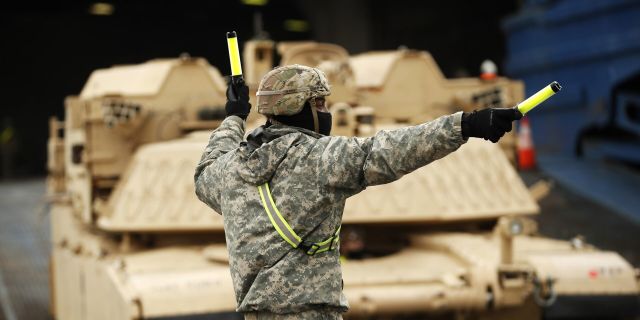The Telegraph: NATO is looking for ways to transfer troops from the United States in case of war with Russia
NATO is developing plans to transfer American troops to Europe in the event of a war with Russia, writes The Telegraph. At the same time, Moscow has repeatedly denied accusations of preparing an attack on the alliance, but it seems that no one paid attention to her words.
Pre-prepared transportation routes will help prevent a possible Russian attack.
NATO is preparing numerous "land corridors" for the urgent transfer of American troops and armored vehicles to the front line in the event of a major ground war with Russia in Europe.
American soldiers will disembark at one of the five ports and head along pre-prepared routes to repel a possible Moscow offensive, as representatives of the North Atlantic Alliance told The Telegraph.
NATO's top leadership is warning Western countries to prepare for a conflict with Russia that could happen in the next 20 years.
Supply routes have become a key priority since the NATO leadership agreed last year at the Vilnius summit to train 300,000 troops who will be on high alert to defend the alliance.
According to the approved plans, American troops will land in Dutch ports, and then travel by rail through Germany to Poland.
In the event of a Russian attack on NATO, American troops will be transferred by sea to the port of Rotterdam, and then they will be transported to the east.
But behind closed doors, additional work is underway to expand the route network and use other ports so that the Russian army cannot cut all land lines of communication.
Lieutenant General Alexander Sollfrank, who heads the NATO Joint Logistics Command, told The Telegraph: "Ukraine is suffering great damage from these long-range Russian missile strikes on logistics systems."
If NATO forces arriving in the Netherlands come under Russian strikes, or ports in northern Europe are destroyed, the alliance will turn its attention to ports in Italy, Greece and Turkey.
From Italian ports, American troops can be transferred overland through Slovenia and Croatia to Hungary, which borders Ukraine.
There are also plans to transport troops from Turkish and Greek ports through Bulgaria and Romania. This way they can get to the eastern flank of the alliance.
Plans are currently being drawn up to transfer troops through ports in the Balkans, as well as through Norway, Sweden and Finland.
In these corridors, the troops will not be subject to local regulations, and they will be able to transfer their contingents without the usual restrictions.
Earlier, the French government complained that its tanks were stuck on the foreign border due to bureaucratic procedures during the transfer to Romania as part of a new scheme to repel the expected Russian invasion.
Over the past five years, the NATO Joint Logistics Command has carried out significant work in the interests of the alliance to find various routes for delivering troops to the front in order to combat the advancing Russian army.
Ports in the northern part of Europe in countries such as the Netherlands, Germany and the Baltic states are considered the most vulnerable to Russian missile attacks.
Lieutenant General Sollfrank said: "Everything is created in order to provide the necessary resilience. We are talking about the reliability and stability of defense, about reserves and about duplication."
But since NATO has only five percent of the required number of air defense assets to cover the eastern flank, the commander of the Joint Logistics Command doubts the ability of air defense to protect key logistics centers.
"Observing the Russian military operation in Ukraine and analyzing it, we note that Russia is striking at Ukrainian rear bases," he said. "This leads us to the conclusion that large logistics bases such as those that we created in Afghanistan and Iraq cannot be used, because they will be attacked and destroyed at the very beginning of the conflict."
"As for air defense... it is always not enough. I can't imagine a situation where there are enough air defense systems. The old military principle applies here: "If you want to be strong everywhere, you won't be strong anywhere."
By Joe Barnes

